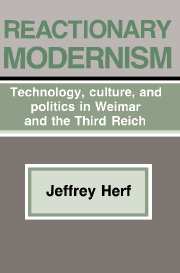Book contents
- Frontmatter
- Contents
- Preface
- 1 The paradox of reactionary modernism
- 2 The conservative revolution in Weimar
- 3 Oswald Spengler: bourgeois antinomies, reactionary reconciliations
- 4 Ernst Jünger's magical realism
- 5 Technology and three mandarin thinkers
- 6 Werner Sombart: technology and the Jewish question
- 7 Engineers as ideologues
- 8 Reactionary modernism in the Third Reich
- 9 Conclusion
- Bibliographical essay
- Index
4 - Ernst Jünger's magical realism
Published online by Cambridge University Press: 31 October 2009
- Frontmatter
- Contents
- Preface
- 1 The paradox of reactionary modernism
- 2 The conservative revolution in Weimar
- 3 Oswald Spengler: bourgeois antinomies, reactionary reconciliations
- 4 Ernst Jünger's magical realism
- 5 Technology and three mandarin thinkers
- 6 Werner Sombart: technology and the Jewish question
- 7 Engineers as ideologues
- 8 Reactionary modernism in the Third Reich
- 9 Conclusion
- Bibliographical essay
- Index
Summary
“Ours is the first generation to begin to reconcile itself with the machine and to see in it not only the useful but the beautiful as well.” With unmatched literary flare, Ernst Jünger sought to reorient attitudes toward technology among the right-wing intellectuals of the Weimar Republic. His works are free of the ambivalences that still plagued Spengler. Rather, they exude a sense of explosive discovery, of a revolutionary breakthrough beyond bourgeois society. More than any of the leading conservative revolutionaries, Jünger drew on the Fronterlebnis (front experience) of World War I to reconcile political reaction and modern technology. During the Weimar Republic, his essays and political writings were prolific to say the least. Five books, over 100 essays, three collections of photographs, and an edited collection of essays on the war experience testify to the energy Jünger devoted to recalling the lost treasure of the postwar German Right, the armed community of men in the trenches, and to generalizing this charismatic experience into a political Utopia applicable to the postwar industrial order. Jünger appealed to the returned veterans unable or unwilling to adjust to civilian life and to those too young to compare his mythic descriptions of the war with their own memories. The Fronterlebnis was, to use Ernst Bloch's term, his concrete Utopia, one that prefigured a community uncorrupted by capitalist exchange relations. Jünger's contempt for the market was no less intense than that of leftwing communists such as Lukács.
- Type
- Chapter
- Information
- Reactionary ModernismTechnology, culture, and politics in Weimar and the Third Reich, pp. 70 - 108Publisher: Cambridge University PressPrint publication year: 1985
- 1
- Cited by



